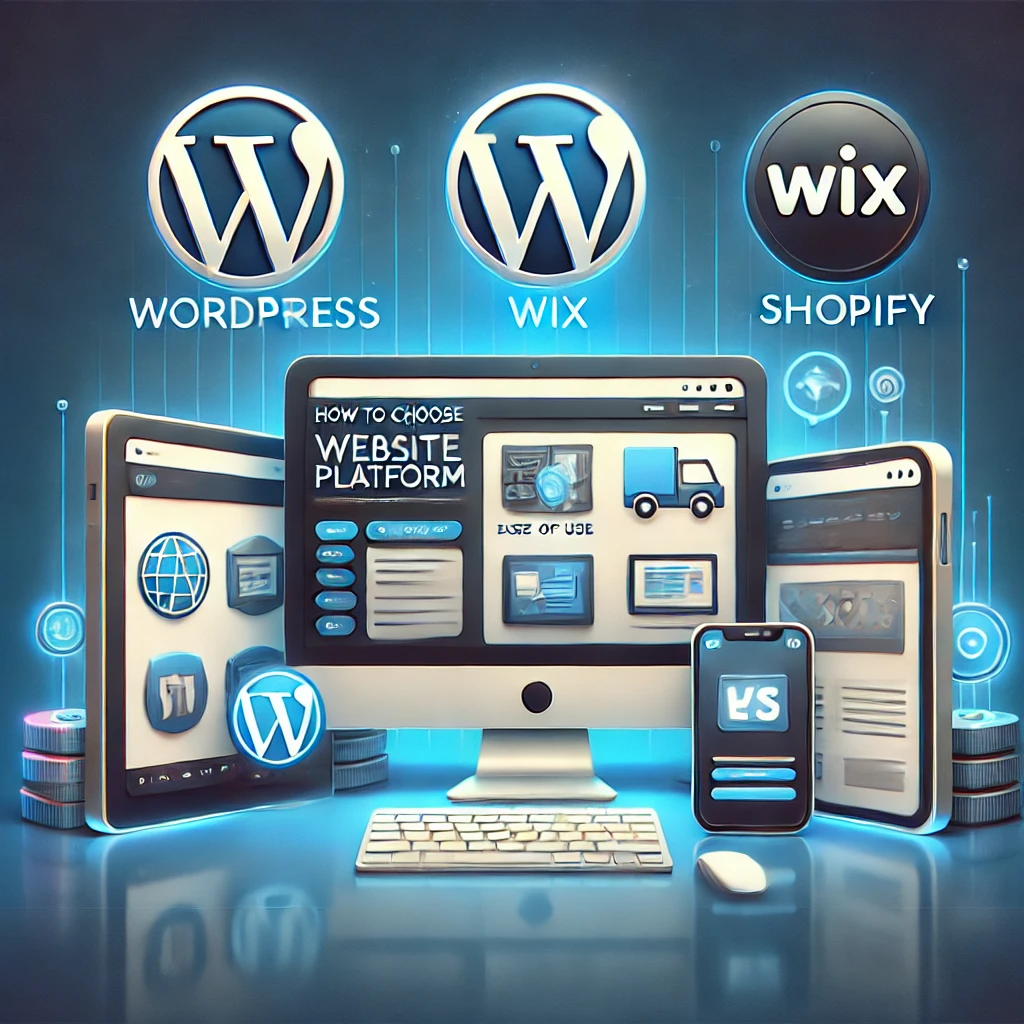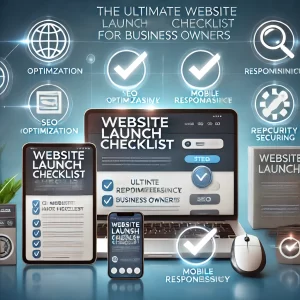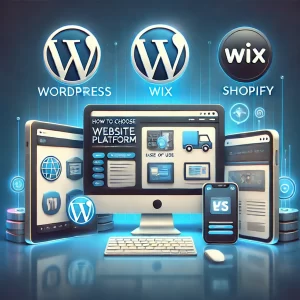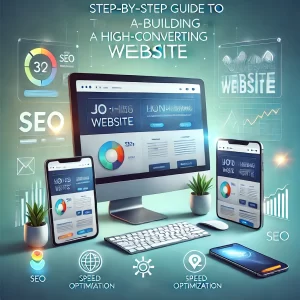
When building a website, one of the most important decisions you’ll make is choosing the right platform. The platform you select will impact your site’s design flexibility, functionality, scalability, and overall ease of use.
Three of the most popular website platforms today are WordPress, Wix, and Shopify. Each platform caters to different needs, so the best choice depends on your goals, technical skills, and budget. This guide breaks down the features, pros, and cons of each platform to help you make an informed decision.
1. Understanding Website Platforms
A website platform, or CMS (Content Management System), is the tool used to build and manage your website without needing extensive coding knowledge.
Key Factors to Consider When Choosing a Platform:
- Ease of Use: How beginner-friendly is it?
- Design Flexibility: Can you customize it fully?
- Features: Does it support the functionality you need?
- Cost: Is it within your budget?
- Scalability: Can it grow with your business?
Let’s dive into the specifics of WordPress, Wix, and Shopify, three top contenders in the website platform space.
2. WordPress: The Powerhouse of Flexibility
Overview:
WordPress powers over 40% of all websites on the internet, making it the most popular CMS in the world. It’s open-source, highly customizable, and works well for blogs, portfolios, e-commerce stores, and more.
Key Features:
- Thousands of themes and plugins for customization.
- Full control over design and functionality.
- Integrates seamlessly with SEO tools, analytics, and third-party platforms.
Pros:
- Unlimited Customization: Perfect for creating unique websites.
- Scalable: Suitable for small blogs to enterprise-level websites.
- SEO-Friendly: Advanced tools to optimize your website for search engines.
- Vast Community: Access to tutorials, forums, and developers.
Cons:
- Steep Learning Curve: May feel overwhelming for beginners.
- Requires Maintenance: Updates and backups are your responsibility.
- Cost Can Add Up: Hosting, premium themes, and plugins aren’t free.
Best For:
Businesses that want complete control and flexibility, from blogs to complex e-commerce sites.
Pro Tip: If you’re tech-savvy or have access to a developer, WordPress is unmatched in customization.
3. Wix: The Beginner-Friendly Builder
Overview:
Wix is a drag-and-drop website builder designed for simplicity and ease of use. It’s ideal for small businesses, freelancers, and creatives who need a professional site without technical skills.
Key Features:
- Drag-and-drop editor with pre-designed templates.
- Built-in tools for SEO and marketing.
- Hosting included in all plans.
Pros:
- Easy to Use: Intuitive editor with no coding required.
- Quick Setup: Get a website up and running in hours.
- Affordable: Lower upfront costs for small businesses.
- App Integration: Access to Wix’s app market for added features.
Cons:
- Limited Scalability: Not ideal for large or complex websites.
- Less Control: Customization options are limited compared to WordPress.
- Wix Branding on Free Plans: Unprofessional for businesses.
Best For:
Individuals or small businesses needing a simple website, like portfolios, blogs, or small stores.
Pro Tip: Wix is perfect for those who value ease of use over extensive customization.
4. Shopify: The E-Commerce Specialist
Overview:
Shopify is a platform designed specifically for building online stores. With its user-friendly tools and robust e-commerce features, it’s a top choice for businesses selling physical or digital products.
Key Features:
- Secure and scalable e-commerce hosting.
- Inventory management and payment processing built-in.
- Access to Shopify apps for added functionality.
Pros:
- All-in-One E-Commerce Solution: Everything you need to run an online store.
- Secure Payments: Built-in payment gateways with fraud protection.
- 24/7 Support: Reliable customer service for troubleshooting.
- Mobile Optimization: Templates designed for mobile shoppers.
Cons:
- Higher Costs: Monthly fees plus transaction fees can add up.
- Limited Non-E-Commerce Features: Not suitable for blogs or non-sales-focused websites.
- Customization Constraints: Design options are more restricted compared to WordPress.
Best For:
Businesses focused entirely on selling products online.
Pro Tip: If your main goal is to run an online store, Shopify offers unparalleled e-commerce capabilities.
5. Comparison Table: WordPress vs. Wix vs. Shopify
| Feature | WordPress | Wix | Shopify |
|---|---|---|---|
| Ease of Use | Moderate (requires learning) | Very Easy | Easy |
| Customization | Unlimited | Limited | Moderate |
| Cost | Varies (Hosting + Plugins) | Low to Moderate | Moderate to High |
| SEO Features | Advanced | Basic to Moderate | Moderate |
| E-Commerce Features | Advanced (via WooCommerce) | Basic | Excellent |
| Scalability | Excellent | Limited | Excellent |
| Best For | Blogs, complex sites | Simple sites, portfolios | Online stores |
6. Making the Right Choice
Choose WordPress If:
- You need full control over your website’s design and features.
- You want advanced SEO tools and scalability.
- You’re comfortable learning the platform or hiring a developer.
Choose Wix If:
- You’re a beginner looking for a quick and easy way to create a website.
- You don’t need complex functionality or heavy customization.
- Your budget is limited, and you prefer an all-in-one package.
Choose Shopify If:
- Your main goal is to sell products online.
- You want a secure, reliable platform with powerful e-commerce tools.
- You’re okay with monthly fees in exchange for ease of use.
The Tech Plug: Helping You Choose and Build Your Website
At The Tech Plug, we understand that every business has unique needs. Whether you’re leaning toward WordPress, Wix, or Shopify, our team can guide you through the process of building a website tailored to your goals.
Why Choose Us?
- Expertise in all major platforms.
- Custom solutions for businesses of all sizes.
- Ongoing support to ensure your site grows with your business.
Let’s find the perfect platform for your website. Contact us today to get started!
FAQs
1. Can I switch platforms later?
Yes, but switching platforms can be complex. It’s best to choose the right one from the start.
2. Which platform is the cheapest?
Wix offers affordable plans, but WordPress can also be budget-friendly depending on hosting and plugins.
3. Can I sell products on WordPress?
Yes! Using plugins like WooCommerce, WordPress becomes a powerful e-commerce platform.
4. What if I want both a blog and an online store?
WordPress is the most flexible platform for combining blogging and e-commerce. Shopify can also handle this with added apps.
5. Do I need coding knowledge to use these platforms?
- WordPress: Some coding knowledge is helpful but not necessary.
- Wix: No coding required.
- Shopify: No coding required for basic use.





